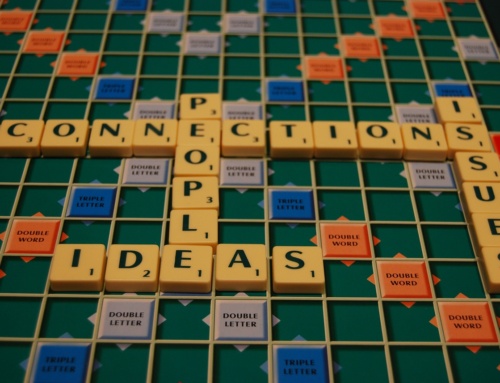 I wrote a post last year entitled, “Yeah, Why Don’t Managers Think Deeply,” prompted by an article in Harvard Business Review. Judging by the posted comments as well as the e-mails that I received, the notion that we seem to almost discourage creating opportunities to think deeply about our business, our strategies and our jobs, resonates with many people.
I wrote a post last year entitled, “Yeah, Why Don’t Managers Think Deeply,” prompted by an article in Harvard Business Review. Judging by the posted comments as well as the e-mails that I received, the notion that we seem to almost discourage creating opportunities to think deeply about our business, our strategies and our jobs, resonates with many people.
Are we losing our ability to focus?
Maybe. Maybe we never had it, and it is the exception instead of the rule, but it just seems so much harder in this noisy, interruption-driven, always-on world to focus on an issue and work through it to creative, complete solutions. We’re too busy racing from one sound-bite opportunity to another, focusing our precious gray matter on topics for nanoseconds before the next interruption comes along.
If left alone without new stimuli for more than a few minutes, we seek them out on-line via social networking sites, through e-mail or even in the ubiquitous and mostly useless meetings that dominate our corporate calendars. Go a few minutes without an e-mail, and I’m willing to bet that you are worried that something is wrong.
I’ve discussed this with many other colleagues and neighbors, and perhaps it is generational, but we all see and sense the same chronic societal attention deficit disorder.
No one seems to pay attention for long. In the work environment, our cellphones and e-mail devices are on and we engage constantly about the urgent and often the unimportant. We don’t seem to solve and create as much as we should.
Our children only exist in “heavy noise” environments, where socializing includes talking, interacting with many on the web, texting on the cell phone, playing music and studying (??) all at the same time.
Social networking sites are powerful and exciting and valuable for certain things. I love LinkedIn and Twitter for the opportunities they afford to meet and connect with old and new acquaintances and for pure networking. However, they can also be addicting and suck precious time out of your days and nights interacting in sound-bites.
I’ve noticed that I struggle to read many books from cover to cover anymore. True, most of the books I’ve been reading lately are fairly boring business books, where all of the meat is in the introduction, the first chapter and the last chapter. Nonetheless, I find that I want the essence of the book quickly and then I want to move-on to my next intellectual stimulus.
During the few minutes that I’ve been writing this, a quick glance indicates that 3 new e-mails have come in, I’ve got several Twitter updates and someone has decided to follow me, so courtesy says I ping them back. I just received a blog comment that indicated my posts are too long (tough, don’t read them!), someone is dialing me on Skype, I have a fresh text from my son at college (definitely looking for money!) and I have a new voice mail message. THE NOISE IS DEAFENING!
OK, I’ve designed my work environment to allow for all of those interruptions, so I have no one to blame but myself. My guess is however, that your work environment is not too dissimilar. We have created an interruption-driven world where we consciously choose to be interrupted and not to think deeply.
The lack of deep thinking is not a good thing.
Maybe you can “Create” in this noisy environment, but I cannot do it effectively. Nor can most people that I know.
I need to wrap up this post and focus on a new leadership keynote, create some new tools for an upcoming workshop and get back to work on my e-book. I now turn off my internet connection and cell phone just to concentrate. The more I do this the more I create, solve, innovate and produce.
The Bottom-Line for Now:
Be careful about becoming an actor in The Case of the Rapidly Shrinking Attention Span. As a leader, you want people and teams to focus. You need to create opportunities to create for your teams and for yourself.
Educate your associates on the power of focus and silence. Do the same for yourself. Don’t let your ability to think deeply be stolen by the false idol of Always-On communication.






Thank you for this post. I enjoyed reading it — from beginning to end. My guess is that many of us lament quieter days and the luxury of having more time to think before we act. Regrettably, technology is sometimes our slave and our master.
How I long for the good ol’ days, when people couldn’t track you down from sunrise to sunset. I also miss the art of conversation; especially with many of my younger friends. Some will only respond via text or Twitter. They’re moving too fast and don’t want to be bogged down in words. Bogged down? Do you really have so little to say, and think so little of your own self expression?
Okay, enough rant. Thanks, again for speaking my mind, as well as yours. Ironically, as I write this, I’m also streaming my favorite NPR station. Hmmmm, maybe I’d better work on my attention span, too.
You hit on a great point that is as timely as ever. Having played the lead role in “The Case of the shrinking attention span” myself, I found it was becoming more and more difficult to work on strategy while being constantly interrupted. I know there have been studies that indicate it takes us approximately 20 minutes uninterrupted to get focused on a thought. So each interruption only adds time to the process of deep thinking and problem solving.
Not to sound TOO old here, but before the internet, before twitter we spent more time with customers and gathered market information on a daily basis. If we wanted to know something, we went out and met with a client or worst case called them. (And they answered their phones)
Today we have email and voicemail that can find us anywhere. We have social media venues like twitter, and linked in, facebook, blogs and enough white papers and eBooks fill your hard drive.
Today we can gather data through the internet and conduct online surveys. However the most valuable information that truly helps me (as old school as it is) is speaking with live people; potential customers, current customers, people evaluating our product and even people who chose a competitor’s product.
We are always inundated with information. What I have done to spend more time on strategic thinking; thoughts to service my customers and grow include;
• Time segmentation , first thing in the a.m. before work I spend 90 minutes , no email, no cell, reflecting with a pad of paper – kind of like brainstorming on paper , the first two hours of work is spent returning customer email,…. From 6-8 pm in social media tools and so on…
• I force myself to listen; one way I do this is I take copious notes. At the end of each week I review my notebook looking more for overall trends and consistent unmet needs of our market than the various “to-do’s” left unchecked
• ½ my time is spent in market communication, understanding market problems, asking questions and listening
• I decide upfront what I will, and I what I will not explore this month based on its proximity to my individualized distinctive competence and the needs of my customers.
• Each month pick one thing I would like to learn more about that fulfills a personal or professional need.
I believe leaders must be readers, and they must continue to grow in knowledge.
I believe we must strategically choose our thought life, or it will be filled without much semblance of order.
I work hard to be intentional about what I chose to spend my thought life thinking about.
All the best,
Mark
Karon and Mark, thanks for your comments and for sticking with the post all the way to the end! Mark, I wish I was as disciplined as you. Best, Art